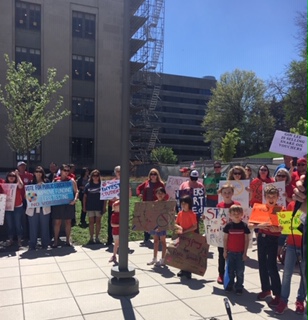As Gov. Bill Lee’s voucher proposal advances through the legislative process and, at least in the Senate, grows to cost significantly more money while reducing accountability, parents around the state are rising up and speaking out against the plan.
Chalkbeat reports on an event in Nashville on Tuesday where parents and teachers expressed opposition to vouchers and also indicated another demonstration was forthcoming.
“What this plan is going to do is take money from over 90 percent of our kids and give it to just a few,” said Lauren Sorensen, a Knox County teacher who helped organize the event.
“Our legislators actually have a constitutional duty in Tennessee to maintain and support a public education. They have no duty to support private education. And simply put, they are not doing their jobs,” Sorensen said.
The rally drew parents too, including Patty Daniel whose two children attend public schools in Williamson County, near Nashville.
“All of the parents I know do not want vouchers, and we are baffled as to why some of our elected officials are so intent on pushing this bill,” Daniel said. “I feel like they are listening to high-powered lobbying groups and not to actual parents and teachers.”
Daniel’s statement is right on the money, literally. Key legislative leaders received significant financial support from pro-privatization groups like the Tennessee Federation for Children and Tennessee CAN.
Meanwhile, dark money groups like Tennesseans for Student Success are attacking any Republicans who deviate from support for Lee’s voucher scheme. Even embattled state Rep. David Byrd, an admitted sex offender, faced attacks and repercussions from legislative leadership — not for his bad behavior but for his vote against vouchers.
The latest version of the plan will now cost a minimum of $219 million at full implementation. That’s enough money to give every teacher in the state a pay raise of around 7.5%.
Debate is sure to heat up in the next two weeks as the proposal moves toward a likely floor vote in both the House and Senate.

For more on education politics and policy in Tennessee, follow @TNEdReport
Your support — a one-time or monthly contribution — makes reporting education news possible.